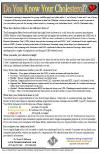Know your complete cholesterol profile in 5 minutes
Cholesterol lowering is important for young, middle-aged, and older adults. 1 out of every 2 men and 1 out of every 3 women will develop heart disease sometime in their life. Whether you have heart disease or want to prevent it, you can reduce your risk for having a heart attack by lowering your cholesterol level – ask Dr. Melamed today.

What does cholesterol have to do with heart disease?
The Framingham Heart Study established that high blood cholesterol is a risk factor for coronary heart disease (CHD). Results of the Framingham study showed that the higher the cholesterol level, the greater the CHD risk. A direct link between high blood cholesterol and CHD has been confirmed by the Lipid Research Clinics-Coronary Primary Prevention Trial (1984) which showed that lowering total and LDL (“bad”) cholesterol levels significantly reduces CHD. A series of more recent trials of cholesterol lowering using statin drugs have demonstrated conclusively that lowering total cholesterol and LDL-cholesterol reduces the chance of having a heart attack, needing bypass surgery or angioplasty, and dying of CHD-related causes.
What can make your cholesterol high?
Your blood cholesterol level is affected not only by what you eat but also by how quickly your body makes LDL (“bad”) cholesterol and disposes of it. In fact, your body makes all the cholesterol it needs, and it is not necessary to take in any additional cholesterol from the foods you eat.
Many factors help determine whether your LDL cholesterol level:
- Heredity: Your genes influence how fast LDL is made and removed from the blood.
- You Diet: Saturated fats and cholesterols in the foods you eat make your LDL level go up.
- Weight: Excess weight tends to increase your LDL level.
- Exercise: Regular physical activity may lower LDL cholesterol and raise HDL (“good”) cholesterol levels.
- Age and Sex: Before menopause, women usually have lower cholesterol than men. As women and men get older, their blood cholesterol levels rise.
- Alcohol: Alcohol intake increases HDL but does not lower your LDL. Drinking too much alcohol is a risk.
- Stress: Stress over the long term has been shown in several studies to raise blood cholesterol levels.
What does your cholesterol mean to you?
Your LDL level is a good indicator of your risk for heart disease. Other risks to consider include, age, family history of early heart disease, cigarette smoking, high blood pressure, diabetes and low HDL (“good”) cholesterol. Your LDL cholesterol will fall into one of these categories:
- Desirable less than 130 mg/dL
- Borderline high risk between 130-159 mg/dL
- High risk 160 mg/dL or higher
The key point to remember is the lower your LDL cholesterol, the lower your risk. Dr. Melamed may prescribe a diet low in saturated fat and cholesterol, regular exercise and a weight management program if you’re overweight. If you can’t lower your cholesterol with these efforts, medications may also be prescribed to lower your cholesterol.
Do you know your cholesterol level?
Just a simple finger-stick is all you need to check your cholesterol level. In virtually 5-minutes we can check your complete lipid profile, without the anxiety of a venipuncture. We offer the same level of accuracy and precision provided by laboratories.
